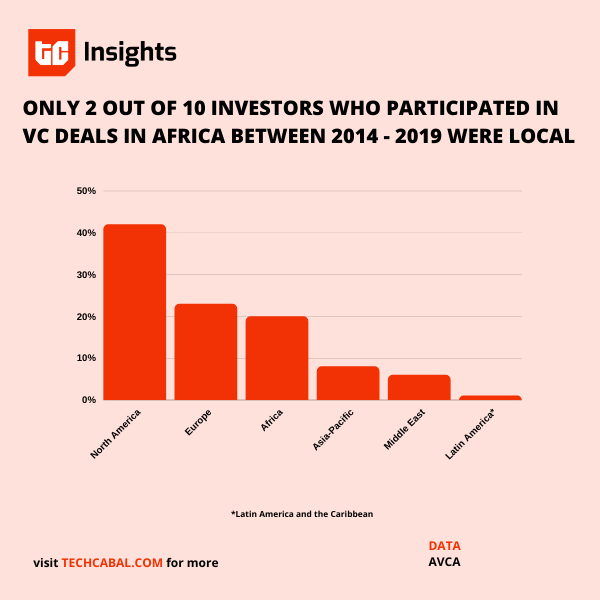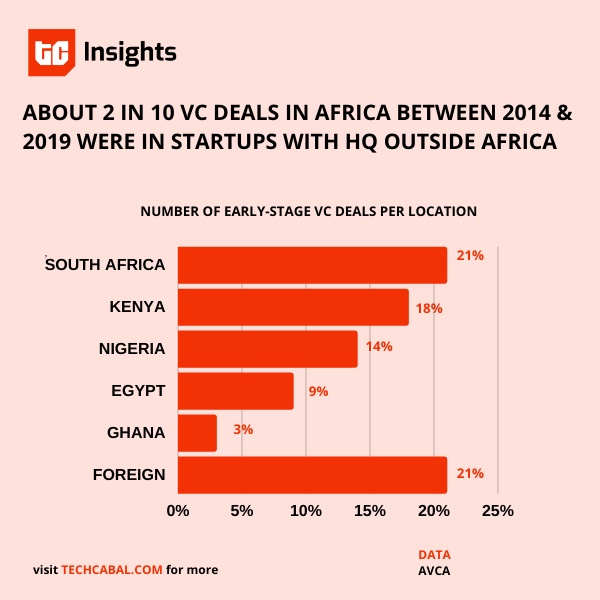|
|
|
|
|
|
JULY 26, 2020
This newsletter is a weekly in-depth analysis of tech and innovation in Africa that will serve as a post-pandemic guide. Subscribe here to get it directly in your inbox every Sunday at 3 pm WAT.
|
|
|
|
|
|
|
|
|
Most likely spurred by the global Black Lives Matter movement, the African tech ecosystem has been abuzz with conversations around funding bias.
Even though this issue has existed on
the continent for a while now, an article reignited the conversation and has gotten people talking. Ever since white founders have founded startups in Africa, data has shown that they have always gotten more funding than their fellow Africans.
Again, this conversation is not new. But beyond nuanced debates around “white and black” founders and capital, there are introspective questions that need answering on this matter.
Before we proceed, welcome to the second edition of your favourite weekend digest, today we are taking a look at some not-so-popular aspects to the aforementioned topic.
You
can still catch up with previous editions of The Coronavirus Weekly
Newsletter and last week’s edition, the first dispatch of its iteration; The Next Wave.
Let’s dive in.
|
|
|
|
|
|
|
Where is the “black capital”?
At a popular cafe in Nairobi, over a steaming cup of dawa, a startup founder sat across from me and lamented their inability to raise funding. They are
sure this dearth has nothing to do with their 2-year-old business, and everything to do with the colour of their skin.
“This startup with a white founder that does the exact thing we do has been in the market for barely a year, and raised a huge chunk of money, a lot of it from VCs we have been to before. They even asked me to come consult on the due diligence for the deal,” the founder lamented.
I came to learn that this founder’s experience is commonplace in Kenya.
Away from the East African country and across popular startup cities in Africa, white founders have always gotten a chunk of investment money coming into the continent.
“It’ll be naive to believe that race doesn’t play a part in [raising] capital.” Rebecca Enonchong said in an event from yesterday that attempted to discuss the issue with stakeholders across Africa.
Apart from Enonchong, Vuyisa Qabaka, Iyin Aboyeji, Meriem Jamme, and CK Japheth were other panelists on that particular edition of Startup Saturday Series from Kenyan-based Lawyers Hub.
“Capital may not have colour, but certain colour definitely has more access to capital,” Vuyisa Qabaka said in response to Iyin Aboyeji’s insistence on decolouring capital, a move which can be construed as downplaying the conversation’s validity.
But Aboyeji asked a question that is in line with today’s enquiry:
“We [Africans] have capital too, what are we doing with our capital?”
Constantly debating the rationale behind the disbursement of “white capital” is a conversation that is swinging between the blurry lines of valid, and entitlement.
Beyond that, why do African HNIs, organisations, and governments not invest in African tech? Where is the “black
capital”?
|
|
|
|
|
Seeking black funding
In May 2016, I wondered why “Nigerian moneybags” were not investing in the country’s then infant tech ecosystem. Two months later, I made a (wish)list of Nigerian HNIs that I hoped would do these investments.
On an African level, a lot of the reasons from that 4-year-old introspection is still valid today: most of the potential investors are risk averse, have not seen any success markers, do not understand startups, and a surprising number of them have been burnt in the past, badly.
“There are people that can invest in startups at their early stages, which is a crucial stage, but a lot of stability needs to happen on the homefront. From destabilising government policies to socioeconomic factors, and even toxic founder behavior, there are a lot of things we need to fix in Africa to unlock funding from within,” an active investor on the continent told me, pleading anonymity.
This investor told me multiple stories of startup founders that have made away with African investors’ money, and shut down businesses without any due diligence.
“Most times they do this because they believe there won’t
be repercussions from their ‘brothers and sisters’, but this is erroneous, stories spread and reputations are damaged. Sometimes innocent people pay,” they said.
Earlier in the aforementioned event, Vuyisa Qabaka had stressed the importance of accountability to investors.
Things are looking up
According to Aboyeji, he pitched Tony Elumelu in 2014 and the Nigerian billionaire banker, “laughed me out of his office,” Aboyeji recalls.
By the end of that year, Elumelu most likely had a ‘Road to Damascus moment’ and the Tony Elumelu Entrepreneurship Programme (TEEP) was born. Till date, the “$100 million commitment to identify, train, mentor and fund 10,000 African entrepreneurs in 10 years has benefitted over 9,000 Africans with $5,000 equity-free seed capital, and mentorship.
Change is painfully slow, and therefore easy to miss, but in this case, things are definitely not what they used to be. In the coming years, slowly but surely, Africa will yield more Elumelus who either have philanthropic and or purely business motives.
I forgot to mention, if they have not already started, one person from my 2016 wishlist is definitely on the path to actively investing in African startups. Hint: they used to run a bank in Nigeria.
On the VC front, there are more active African investors now than ever. TechCabal recently created a tentative list of early-stage investors in Africa, and the numbers are impressive, at least compared to say, five years ago.
[A list of early stage investors in Africa]
According to the African Private Equity and Venture Capital Association (AVCA), only 20% of investors who participated in VC deals in Africa between 2014 – 2019 were local ones. This is dismal, but the number has been improving over the last 10 years.
While we fight funding racism in Africa’s growing tech ecosystem, we should devote the same energy, or even more, to creating an enabling environment for money from within the continent.
|
|
|
|
|
|
|
DR Congo’s early-stage tech ecosystem.
In Francophone Africa, Congo is the most populated country with an estimated 84 million people. In its capital city, Kinshasa alone, 40,000 phones are sold every month. Technology and innovation lives here, but what is its tech ecosystem like?
In this article, Alexander Onukwue spotlights the growing ecosystem with a focus on a group of entrepreneurs.
The relationship between a Chinese tech billionaire and OPay. African super-app recently shut down some of its performing verticals, and TechCabal learnt that the company’s billionaire chairman Yahui Zhou made these calls.
Zhou has made noteworthy exits and IPOs in America and China, and seeks to replicate the success with OPay. Abubakar Idris expounds on the intricacies of this story.
|
|
|
|
|
|
|
Every week, we will ask our readers, stakeholders, and operators in Africa’s tech ecosystem what they think the new normal will look like, and will share their thoughts here. You can share yours with victor@bigcabal.com with ‘The Crystal Ball’ in the subject line.
“Adtech will not be the same. Brands are currently investing ad dollars in experimental advertising, but there is a lack of technical know-how, hence a lot of uneducated experiments, waste and ROI issues. Things would need to be done differently, programmatic and data-based advertising will be the most effective means of reach.
Audiomack has just moved into a new Nigerian office, Boomplay tripled users last quarter; Netflix launched in Africa; DStv is betting big on Showmax. That’s half of the pointers that streaming is finding its place in African culture and the earlier advertisers start thinking about moving with audiences the better.”
– Abiodun Mudele, Senior Sales Account Manager, Transsion
|
|
|
|
|
|
|
African startup. Foreign HQ.
Some of Africa’s famous and best-funded startups including Andela, Paga, Flutterwave, Paystack, Branch, Tala and SureRemit are actually foreign by incorporation. While choices like HQ and country of incorporation are sometimes influenced by the founders’ nationalities, the vast majority are investment and economic decisions.
|
|
|
|
|
The opacity of tax laws and dynamism of regulation in African countries make VCs prefer domiciling their funds outside the continent. The favourable laws and the clarity of the regulatory environment in some US states and very few African countries like Seychelles and Mauritius make them natural habitats for investors. One other challenge is that
getting money out of the financial systems in certain African countries can be problematic.
The location where VC funds are domiciled in turn influences the choice of startups they invest in. It’s quite common for VCs to urge African founders to incorporate abroad.
Using data from the African Private Equity and Venture Capital Association (AVCA), the majority of early-stage VCs deals between 2014 – 2019 were in startups that had HQ in South Africa. However, it tied with startups that had their HQ abroad; 53% of them are incorporated in the US.
It is quite certain that data on
later-stage deals will provide a different perspective but they are fewer in number. Most startups will likely die from not getting that first check.
There’s been a growing trend of local VCs and funds emerging in places like Nigeria and South Africa which will reduce the need for more founders to incorporate abroad. But to retain capital and intellectual property on the continent, it will require more than an increase in local VCs and funds. There’s a need to take a critical look at the tax laws and regulations to ensure they support investing across the continent.
If
you are a founder in Africa, please fill our investor list here to let us know who gave you your first check. Get TechCabal’s reports and send us your custom research requests here.
|
|
|
|
|
Best wishes for a great week
|
|
|
Stay safe and please observe all guidelines provided by health experts.
You can subscribe to our TC Daily Newsletter; the most comprehensive roundup of technology news on the continent, and have it delivered to your inbox every weekday at 7 am WAT.
Follow TechCabal on Twitter, Instagram, Facebook, and LinkedIn to stay updated on tech and innovation in Africa.
– Victor Ekwealor, Managing Editor, TechCabal
|
|
|
|
|
|
|
|
|
Sign up for The Next Wave
by TechCabal
|
|
|
|
|
|
|
|
|
|
|
Copyright © 2020 Big Cabal Media,
All rights reserved.
You are receiving this email because
you signed up on TechCabal.com
Our mailing address is:
Big Cabal Media
18, Nnobi Street, Animashaun, Surulere, Lagos
Surulere 100001
Nigeria
Add us to your address book
Want to change how you receive these emails? You can
|
|
|
|
|
|
|








Write your views on this post and share it. ConversionConversion EmoticonEmoticon